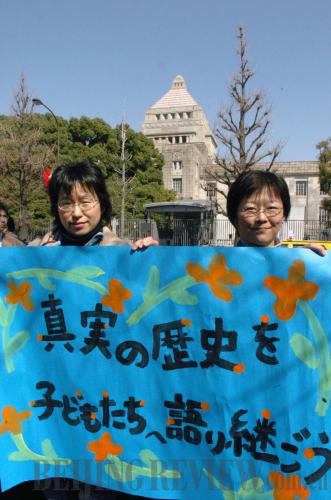|
 |
|
JUSTICE OVERDUE: Japanese women protest in Tokyo on March 15, 2006, urging the government to issue an apology to women who were physically and sexually abused by the Japanese soldiers during World War II (MA PING) |
Meanwhile, Bu noted that, considering all the complexities in each society, it is not surprising the Chinese and the Japanese find it difficult to see eye-to-eye on everything in the past.
With a consensus on the most important issues, such as the aggressive nature of the war, other specific problems will continue to be open to academic discussion, he said.
But over time, according to Bu, academics—rather than politicians seeking points with the public—should continue to be the ones studying and trying to resolve these issues.
China and Japan are now fast leading East Asian integration and growth—a vision long advocated by current Japanese Prime Minister Yukio Hatoyama, Tao said. In this process, he added, it is incumbent for both nations to collaborate in a wide range of areas, he said.
"While doing research on history, we always have our eyes on the future," Tao said.
Echoing Tao's views, Bu said it is possible for East Asian countries to forge a regional community like the EU with their shared cultural traditions, such as Chinese characters and Confucianism.
Efforts to transcend national differences—including the China-Japan joint history research—will contribute to a healthy, enhanced sense of "East Asian identity," he said.
Bu added that this study is taking place against a backdrop of similar surveys worldwide. Germany and France, for instance, began discussing wartime issues shortly after the end of World War II and have since compiled several joint history textbooks.
In 2005, scholars and teachers in China, Japan and South Korea also jointly published a history textbook for middle school students, in an effort to expose mistakes in an earlier Japanese textbook written by a group of right-wing Japanese scholars.
In addition, Japan and South Korea have been engaged in joint history studies since 2002, too. "An East Asian community will be nothing but an illusion unless countries in the region resolve their different evaluations of history," Bu said. | 